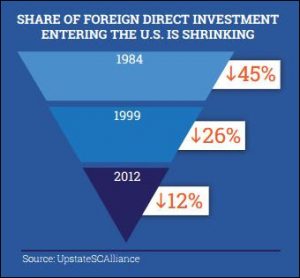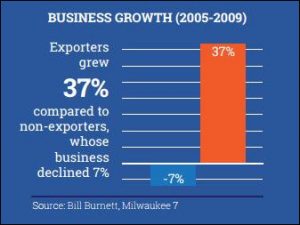(This post is taken from the introduction to the Metro Richmond Exports Initiative report published earlier this month, written by John Accordino, Fabrizio Fasulo & Greg Wingfield under the auspices of the Virginia Commonwealth University’s VCU Center for Urban and Regional Analysis. — JAB)
To ensure Richmond’s future as an economically competitive and vibrant region with a high quality of life, we should consider the roles that the Richmond metropolitan statistical area (MSA) can play in the rapidly growing global economy.
Up to now, Richmond has tapped into the global economy mostly in two ways – as a source of immigrants who have invested their talents here; and as a source of foreign-owned companies that have invested capital here. We must continue to welcome immigrants and foreign capital, however the share of global investment entering the United States has been declining for 30 years and it will continue to do so.
If we are to thrive in the global economy, we must also take fuller advantage of the rapidly growing global demand for goods and services that our region produces or could produce. We must embrace exporting.
Global demand is skyrocketing, as the number of middle-class consumers in China, India, Brazil and other industrializing countries grow, while demand in “post-industrial” Canada, Europe and Japan remains strong. Between 2015 and 2020, for example, 81 percent of global demand for products and services of the sort that American firms produce or could produce will come from other countries, not the United States.
Exporting is good for companies and for the regions in which they are located. Companies that export enjoy higher productivity (revenues per employee) and they are therefore able to pay higher wages and retain talent more easily than their non-exporting counterparts. Exporters produce and patent more product innovations, they grow more quickly, and they have higher market value than their non-exporting counterparts. Moreover, businesses that diversify their portfolios by exporting do not experience the same cyclical fluctuations in revenues that challenge businesses dependent on just the domestic market. All of these benefits, in turn, strengthen the regional economies in which exporters are located.
The Falls of the James have made this region an excellent location for trade for more than a century. Today, Richmond’s central location, marine terminal facilities, and easy access to the Port of Virginia and international airports make it an excellent choice as a major East Coast logistics center that can support both exports and inward trade.
Indeed, many Richmond-area companies already export products or services. Examples include Altria, C.F. Sauer Company, World Art Group, Hamilton Beach, Marooka, Rainbow Station and many others. However, the Richmond metro area as a whole exports below its potential and below the average U.S. metro area.
And although exporting is not for everyone, more Richmond-area companies could export than have done so to date, and many of those that export to just one foreign market could expand their reach to more countries.
The Virginia Economic Development Partnership (VEDP), the Port of Virginia, federal government agencies and a number of private entities provide excellent services to help companies export, but many companies are unaware of these services, or they incorrectly believe that their products or services cannot be exported, or they fear the exporting process.
As of 2015, the Commonwealth of Virginia and the federal government through the U.S. Commercial Service — along with other agencies — are providing more resources to help companies increase exporting. With their support and with the assistance of JPMorgan Chase and the Brookings Institution, Virginia Commonwealth University (VCU), working with the Greater Richmond Partnership (GRP) and Virginia’s Gateway Region (VGR), have created Metro Richmond Exports Initiative, a strategy to increase the Richmond metro’s Gross Domestic Product (GDP).
This effort involves business groups and local economic development offices from the entire metro area. By Sept. 2016, a formal strategy to increase exports throughout the MSA will be in place. It is important that these efforts are sustained as it will take years for Richmond-area businesses to learn to look outward, to the world, to grow their businesses, as companies in other export-oriented countries do.
If we wish to maximize our potential as an economically competitive region with a high standard of living, we must engage in the global economy by significantly increasing our export activities well into the future.




